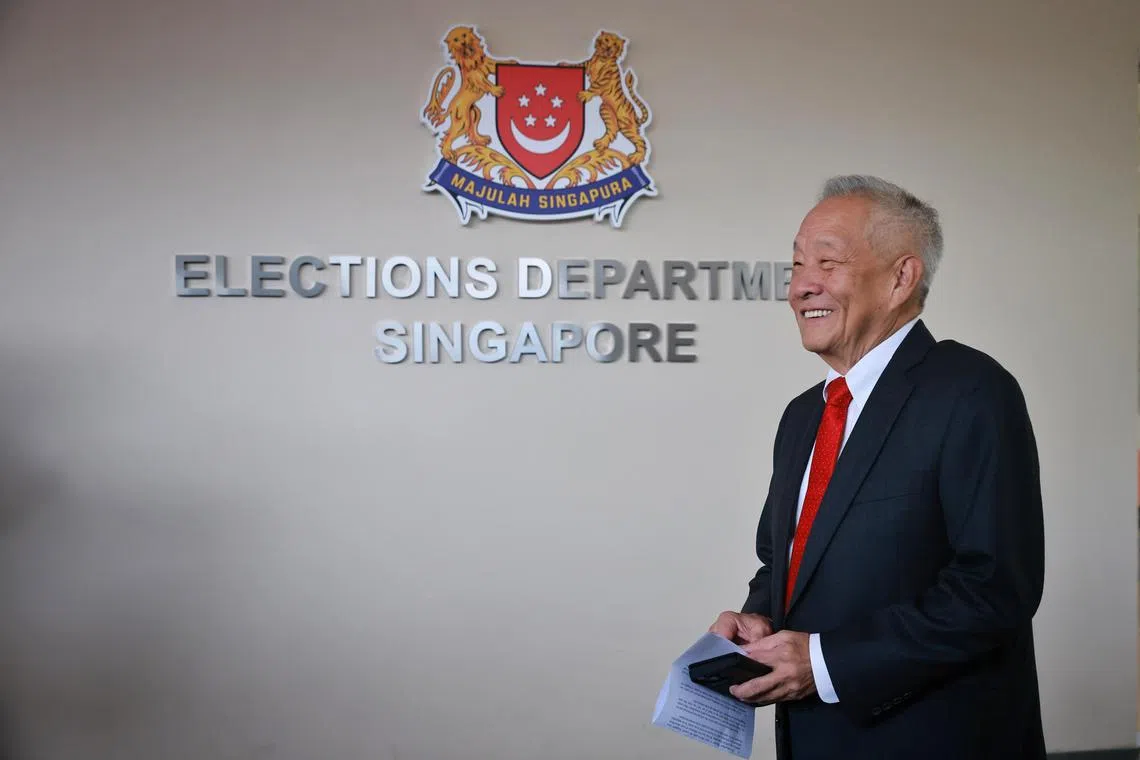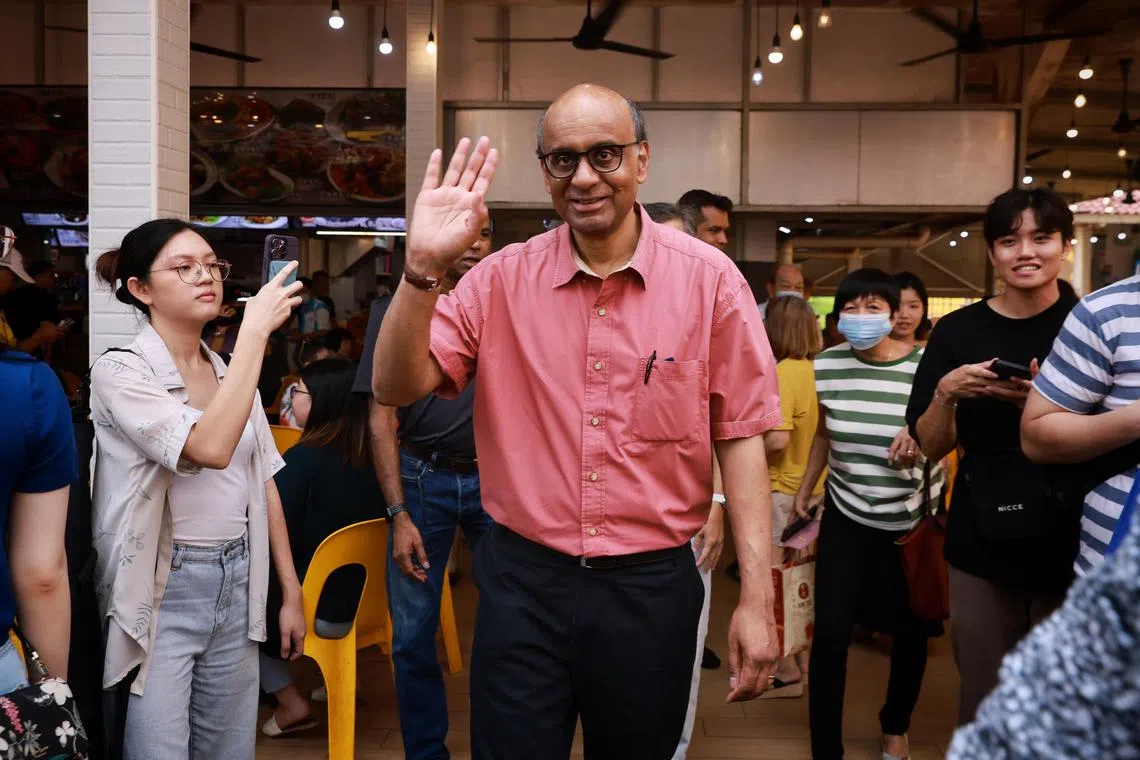Experience and independence key to voters, not age: Observers on presidential hopeful Ng Kok Song
Sign up now: Get ST's newsletters delivered to your inbox

Mr Ng Kok Song said on Wednesday that he will be applying for eligibility based on his public service experience.
ST PHOTO: JASON QUAH
SINGAPORE - Former GIC investment chief Ng Kok Song’s announcement on Wednesday of his intention to run for president
But first, it remains to be seen whether two of the three hopefuls will receive their certificates of eligibility from the Presidential Elections Committee (PEC), said political observers.
Should they be successful, who Singaporeans will vote for depends on what they want out of their president – be it financial management experience, an independent voice or other factors, the observers added.
Both Mr Ng and entrepreneur George Goh, who had earlier announced his own bid,
Former senior minister Tharman Shanmugaratnam meets the public sector requirement.
Mr Goh will be applying under the private sector deliberative route, while Mr Ng said on Wednesday that he will be applying for eligibility based on his public service experience.
According to the Constitution, those who directly qualify under the private sector route have to have been the most senior executive for at least three years of a firm with $500 million in shareholder equity, among other criteria.
Mr Goh has said he is confident that he will qualify.
Under the public sector route, individuals have to have been in certain roles in the public service, or have held the most senior executive post in one of the entities listed on the Fifth Schedule of the Constitution.
Fifth Schedule entities include the Central Provident Fund Board, the Housing Board, Temasek and GIC, among others.
The question of eligibility
Dr Gillian Koh, senior research fellow at the Institute of Policy Studies, said Mr Ng will have to explain how his role in GIC is akin to the top job of other statutory boards or Fifth Schedule entities listed in the Constitution, and may wish to add how he ensured GIC’s health and progress.
Mr Goh will similarly be doing so under the private sector route, she added.
Should only one of the two between Mr Goh and Mr Ng be dropped by the PEC, experts said this would put pressure on the committee to be more transparent in its decision-making process.
National University of Singapore adjunct law professor Kevin Tan said: “I have long advocated greater transparency on the PEC’s decision-making process. It is not good for the institution to keep things shrouded unless challenged legally.”
Political analyst Felix Tan, a Nanyang Technological University (NTU) associate lecturer, concurred, saying: “The selection by the PEC is often shrouded in a blanket of secrecy.
“Similar to electoral boundaries, no one seems to be privy to the processes of the decisions. After all, these decisions concern all Singaporeans, and it would certainly be disingenuous when the PEC is not upfront about how they derive and make their decisions.”
In the event that all three are successful and there is a three-way fight, observers stressed that it is early days yet, and it is hard to tell how the race will shake out.
NTU’s Dr Tan said there was a possibility there might not be a clear winner, with each candidate getting a small fraction of the votes, and “once again, dividing the support for any one individual”.
In the 2011 presidential election, Dr Tony Tan won with 35.2 per cent of the vote, while Dr Tan Cheng Bock received 34.85 per cent. Mr Tan Jee Say and Mr Tan Kin Lian received 25.04 per cent and 4.91 per cent each.
Singapore Management University (SMU) law don Eugene Tan said that so far, Mr Ng has positioned himself as being from the establishment, but not party or government.
“He is positioning himself in the same camp as Mr Goh. Both men have used the word independent to describe themselves,” he said.
“My sense is that Mr Ng and Mr Goh could well be competing for the same votes, should both men qualify to run. These are voters who, all things being equal, might prefer someone not closely tied to the Government and/or the party,” he added.
There will also be Singaporeans who will treat Mr Ng and Mr Tharman as being allied with the Government, and so will consider them, “colloquially, but inaccurately, not independent”, said Prof Tan.
Dr Mustafa Izzuddin, a senior international affairs analyst, said Mr Ng could appeal to the middle ground voter, being seen as the in-between of Mr Tharman and Mr Goh. The litmus test would then be how he connects with and persuades more of this group to vote for him.
“Right now, it seems the middle ground is in favour of Mr Tharman, but the sentiments will wax and wane until it is time to cast their vote,” he said.
Dr Koh said voters may make a distinction between those associated with the governing party, and those who are not.
Only Mr Tharman, she pointed out, has that strong association with the party.
Voters could also make the distinction between those who not only understand, but were part of the management of Singapore’s national reserves – something that is integral to one of the president’s custodial powers, she added.
Only Mr Goh is not part of that group.
Independence and experience
“In the end, it is really how voters understand the role of president,” said Dr Koh.
If in addition to choosing someone who can carry himself or herself well in the ceremonial and community roles, they think that as much independence as possible is important for the custodial role, then someone who has not been associated with the party or even the current system of management of the reserves would be their choice.
If they feel that the experience of the system of management of the reserves is important, then candidates who have been directly involved would be their choice, she added.
Dr Tan said Mr Tharman’s reputation far surpasses that of the other two, such that the other two do not present that much of a threat to his vote share.
“Not only is Tharman known to Singaporeans, he has consistently performed well in the elections as part of Jurong GRC. In addition, Tharman has international standing and recognition of his achievements,” he said.
SMU’s Prof Tan added that while Mr Ng does possess a suite of economic credentials, Mr Tharman has, arguably, more varied and higher profile economic credentials – given his previous roles as finance minister, and his roles in the Monetary Authority of Singapore and GIC.
Dr Koh said a president will need experience in financial management and the right “heartware”, while being a good judge of character.
“Is it demanding? Yes, it is. And this is what past leaders and I believe many Singaporeans also expect of their leaders,” she said. “We have seen all the discourse around the political controversies in the past weeks.”
Prof Tan added that Mr Tharman will likely remain unscathed by the latest political incidents. The former senior minister also has a longstanding reputation of being his own man, he said.

Mr Tharman Shanmugaratnam meeting residents during a walkabout in Teck Whye on July 15, 2023.
ST PHOTO: JASON QUAH
NTU’s Dr Tan added that the president is one who represents Singapore and Singaporeans as a whole, and not party politics.
“While the latest incidents will have an impact on how Singaporeans will vote, they should also realise that they are not voting for a political party,” he said.
Dr Mustafa suggested that the recent spate of incidents could nevertheless result in more protest votes or spoilt votes, with the aim of showing displeasure to the ruling government.
But this is unlikely to dominate voters’ behaviour, he added.
Is age a factor?
Following Mr Ng’s announcement on Wednesday, some online had brought up his age as a factor working against him.
At 75, he is older than Mr Tharman, 66, and Mr Goh, 63.
Political observers were in consensus that age should not be a factor, especially since Mr Ng is still actively running a company.
Dr Tan said: “We should avoid playing the age card, when we are continually asking our workforce to engage older workers as they have more experiences.”
Dr Koh added that given the requirements for presidency, it takes time to build the track record and hone the wisdom that the criteria imply is needed for the role.
In an ageing Singapore
“The questions of the extent to which people are competent, have the heartware, and how well people identify with them, will become far more important than the issue of chronological age,” she added.



